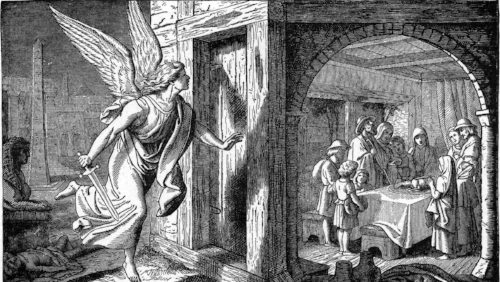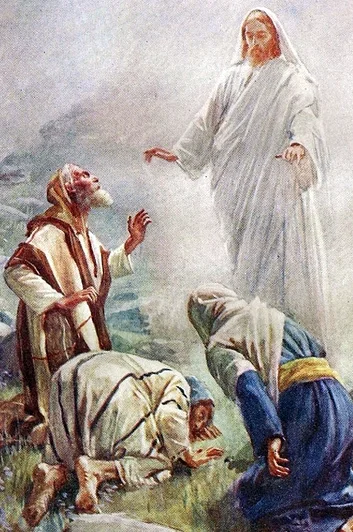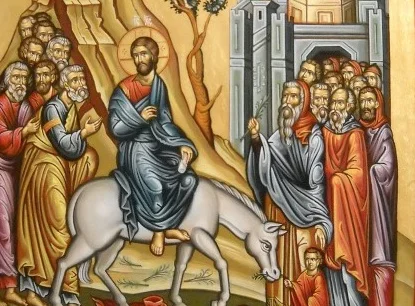[Talk for a future card]
We currently don’t have any cards that address Passover. Due to recent events in our lives and in the world (death, destruction, desperation) we are beginning to rethink this. The question of God’s presence in the face of human suffering is throughout the narrative. Allow us to localize it further.
“For the LORD will pass through to smite the Egyptians; and when he sees the blood upon the lintel, and on the two side posts, the LORD will pass over the door, and will not suffer the destroyer to come in unto your houses to smite you.” (Exodus 12:23)
You know the story: through his proxy Moses, God has upped the plague ante in his battle with Pharaoh. The first born of every household will die at the hands of another divine proxy, The Destroyer (מַּשְׁחִיתהַ), if those inside do not have the symbolic blood affixed to their posts and lintel. The Destroyer will “pass” by if the blood is there.
But notice: “pass” is said twice in this verse, and they are not the same Hebrew word.
First “the LORD will pass{עָבַר `abar } through to smite the Egyptians” (and any Israelite who does not have the blood appropriately splattered)— the LORD, and The Destroyer, will deal death throughout the land. But on the houses with the blood, “the LORD will pass {פָּסַח pacach} over the door” and keep The Destroyer (and Himself) at bay. These two words do not share the same meaning.
The first pass {עָבַר `abar } means to transverse from one location to another— to pass over, through, under something; however the second pass{פָּסַח pacach} might be better translated as “to hover.”
Consider two other passages, in different contexts, where the word is used.
1 Kings 18:21:
And Elijah came unto all the people, and said,” How long will you hover {פָּסַח -pacach} between two opinions? if the LORD be God, follow him: but if Baal, then follow him.” And the people answered him not a word.
For centuries commentators have shown that Elijah is conjuring an image of a bird between two branches; while some have argued that the bird is “hopping” between the branches, the image of the bird hovering is more appropriate to the people’s context: a bird cannot keep up that type of exertion indefinitely, it must choose where it will land, as the people were being demanded for a choice.
Isaiah 31:5:
As birds flying, so will the LORD of hosts defend Jerusalem; defending also he will deliver it; and hovering {פָּסַח -pacach} over he will preserve it.
Again, a prophet uses this word with images of birds in flight. A simple fly over, a quick passing over is not enough to secure the borders of God’s people. The LORD takes up residence over Jerusalem to stop all intruding forces.
The word means to hover over, to remain above something, not merely to pass by.
The image of God hovering over us, protecting us, sparing us from evil, is a great comfort. Until we return to the Exodus passage, where we see the angelic/demon weapon of God’s will, heavily panting beside the Almighty’s wings, waiting to be unleashed.
Until we turn on the news and see the swirling mass of devastation in the Philippines.
Until we walk outside and a thousand disasters unimagined descend, or creep within our comfortably closed doors.
Were the Egyptian infants any more worthy of death than those in Tacloban or Newtown?
We will admit the context is different, but the image is plain: God hovers overhead as death and life hangs in the balance. An image we find a balm and a burden, depending on the time of day, or season of news cycles.
But what do we know: we made this game and are aware that sometimes this world feels like it is all the Hell that we need.



![O Come, O Come Emmanuel (Isaiah 7:14) [An Advent Card Talk]](https://images.squarespace-cdn.com/content/v1/55a9a1e3e4b069b20edab1b0/1483161046976-X5VJE3CMP9T957O72EII/3d-wallpapers-light-dark-wallpaper-35822.jpg)








